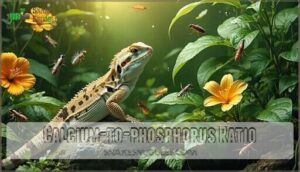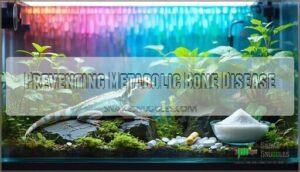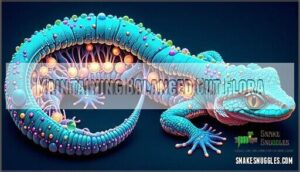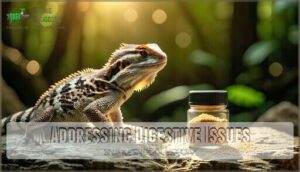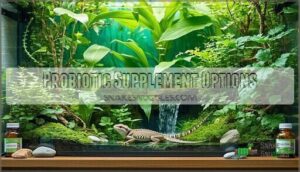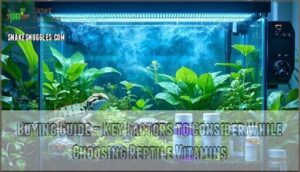This site is supported by our readers. We may earn a commission, at no cost to you, if you purchase through links.
 You’ll need reptile health supplements because even premium commercial diets lack up to 40% of essential nutrients your pet requires.
You’ll need reptile health supplements because even premium commercial diets lack up to 40% of essential nutrients your pet requires.
Calcium with vitamin D3 prevents metabolic bone disease, while multivitamins support immune function and healthy shedding.
Probiotics maintain gut health and boost nutrient absorption by 68%.
Choose species-specific formulations – what works for iguanas won’t suit snakes.
Look for NASC-certified products from established retailers, expect to pay $10-30 for quality supplements.
The right combination of calcium, vitamins, and probiotics transforms struggling reptiles into thriving companions.
Understanding the ideal calcium-to-phosphorus ratio could save your pet’s life.
Table Of Contents
- Key Takeaways
- 8 Best Reptile Health Supplements Reviewed
- 1. reptile vitamins and mineral supplements
- 2. Reptile and Amphibian Multivitamin Supplement
- 3. Reptile vitamin supplement food spray
- 4. Reptile and Amphibian Vitamin Supplement
- 5. Reptile vitamin supplement with beta
- 6. Reptile liquid vitamin supplement concentrate
- 7. Reptile calcium supplement with vitamin
- 8. Reptile probiotic digestive health supplement
- Essential Nutrients for Reptile Wellness
- Calcium and Vitamin D3 for Bone Health
- Multivitamins and Their Role in Reptile Diets
- Probiotics and Digestive Support for Reptiles
- Buying Guide – Key Factors to Consider While Choosing Reptile Vitamins
- Species-Specific Supplementation and Special Considerations
- Frequently Asked Questions (FAQs)
- Conclusion
Key Takeaways
- You’ll need to supplement your reptile’s diet regularly since commercial foods lack up to 40% of essential nutrients, requiring calcium with vitamin D3, multivitamins, and probiotics 2-3 times weekly.
- You should choose species-specific formulations because what works for iguanas won’t suit snakes – herbivorous reptiles need higher calcium and beta carotene, while carnivorous species require different nutrient ratios.
- You’ll want to maintain the proper 2:1 calcium-to-phosphorus ratio to prevent metabolic bone disease, which affects up to 90% of reptiles with inadequate vitamin D3 or UVB exposure.
- You should invest $10-30 in NASC-certified supplements from established retailers, as quality formulations can boost nutrient absorption by 68% and transform struggling reptiles into thriving companions.
8 Best Reptile Health Supplements Reviewed
You’ll find the right supplement for your reptile’s health needs among these carefully reviewed options, from essential calcium formulations to thorough multivitamins.
Each product addresses specific nutritional gaps that commercial diets often leave behind, helping prevent common issues like metabolic bone disease and digestive problems.
1. reptile vitamins and mineral supplements
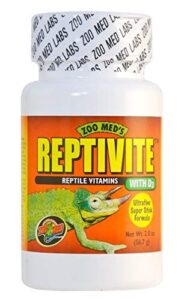
Zoo Med’s ReptiVite with D3 stands out as a thorough vitamin and mineral supplement that’ll transform your reptile’s health.
This ultra-fine powder sticks perfectly to food, delivering complete amino acids alongside essential nutrients.
Originally developed for San Diego Zoo’s turtle collection, it maintains the vital 2:1 calcium-to-phosphorus ratio that prevents metabolic bone disease.
The formula contains no artificial fillers, yeast, or sucrose—just pure nutrition.
With vitamin D3 for ideal calcium absorption, it’s trusted by major zoos worldwide and suitable for all reptile life stages.
Best For: Indoor reptile owners seeking a comprehensive vitamin supplement that prevents soft-shell problems and metabolic bone disease across all reptile life stages.
- Complete amino acid complex aids protein digestion and overall health
- Proven 2:1 calcium-to-phosphorus ratio prevents metabolic bone disease
- Ultra-fine powder adheres well to food for consistent dosing
- Contains vitamin D3 which can cause toxicity if over-supplemented in reptiles with UVB access
- Stick formula may be less convenient than powder for some feeding situations
- Higher cost compared to basic calcium-only supplements
2. Reptile and Amphibian Multivitamin Supplement
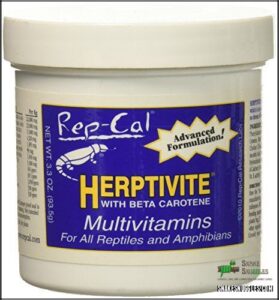
Rep-Cal’s Herptivite stands out as a research-backed multivitamin that delivers precise nutrient ratios for ideal reptile health.
This sea vegetation-based formula contains essential vitamins, minerals, and amino acids that support growth, reproduction, and daily maintenance.
You’ll appreciate its flavorless design and sticky texture that adheres well to insects and vegetables.
While pricier than competitors, users report consistent results across species like bearded dragons, geckos, and dart frogs over years of use.
Best For: Reptile and amphibian owners seeking a comprehensive, research-backed multivitamin that provides precise nutrient ratios for species like bearded dragons, geckos, dart frogs, and snakes.
- More expensive than competing multivitamin supplements on the market
- Some picky eaters may reject food dusted with the supplement despite claims of being flavorless
- Requires mixing with calcium powder as an extra step for better pet acceptance
- Sea vegetation-based formula with precise vitamins, minerals, and amino acids developed from latest nutritional research
- Flavorless and sticky texture that adheres well to insects and vegetables for easy application
- Proven track record with consistent positive results across multiple species over years of use
3. Reptile vitamin supplement food spray
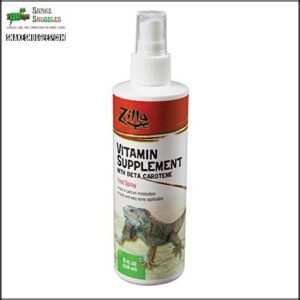
Vitamin food sprays offer a mess-free alternative to traditional powder supplements, making them perfect for picky eaters who avoid dusted food.
You’ll find these liquid formulations deliver essential vitamins A, D3, B-complex, and C directly onto insects, vegetables, or pellets.
Research shows sprayed supplements improve nutrient absorption compared to dusting, especially on moist foods.
Simply spray 1-2 times per meal, wait fifteen seconds, then serve, and consider leading brands like Zoo Med and Reptivite that provide thorough nutrition while reducing waste and selective feeding behaviors in your reptile.
Best For: Reptile owners with picky eaters who refuse dusted supplements or those seeking a cleaner, more efficient way to provide essential vitamins to their bearded dragons, geckos, chameleons, and other reptiles.
- Risk of hypervitaminosis if overused, particularly with vitamin D3 and A formulations
- Some users report packaging issues like bottles arriving slightly opened or leaking during shipping
- Slightly more expensive per dose compared to powdered supplements over long-term use
- Mess-free application eliminates powder waste and ensures even nutrient distribution on all food types
- Better absorption rates compared to traditional dusting methods, especially on moist foods like vegetables
- Prevents selective feeding behaviors since reptiles can’t easily avoid the sprayed nutrients
4. Reptile and Amphibian Vitamin Supplement
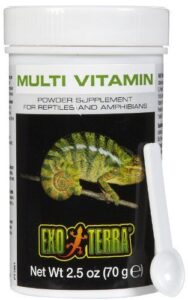
Balanced nutrition doesn’t have to break the bank when you choose this thorough multivitamin formula.
You’ll get vitamin A from beta-carotene, complete amino acids, and essential minerals in one convenient powder. Simply dust insects or mix with fruits and vegetables 2-3 times weekly.
The vegetable-based formulation pairs perfectly with calcium supplements, though leopard gecko owners should alternate rather than combine. Users consistently report improved growth, brighter colors, and enhanced vitality in their reptiles.
Proper supplementation requires understanding reptile vitamin needs to guarantee superior health.
Best For: Reptile and amphibian owners seeking an affordable, comprehensive multivitamin supplement to enhance their pets’ nutrition and overall health.
- Contains beta-carotene instead of preformed vitamin A, which many reptile and amphibian species cannot effectively utilize
- Cannot be used simultaneously with calcium supplements for leopard geckos, requiring alternating schedules
- Some delivery issues reported by users and potential for calcium overlap when combined with other supplements
- Contains vitamin A from beta-carotene, complete amino acids, and balanced minerals in one convenient powder formula
- Easy application by dusting insects or mixing with fruits and vegetables, with clear dosage guidelines of 2-3 times weekly
- Users report visible improvements in pet growth, brighter colors, and enhanced vitality at an affordable price point
5. Reptile vitamin supplement with beta
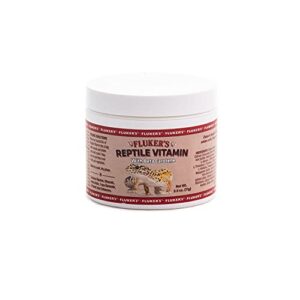
Safety meets effectiveness in this beta carotene-enhanced multivitamin that transforms how your reptile processes vitamin A. Unlike preformed vitamin A supplements that can cause toxicity, beta carotene converts naturally to retinol as needed, eliminating overdose risks.
You’ll notice improved coloration, enhanced immune function, and better growth rates in juveniles. The crystalline amino acids boost absorption while trace elements fill nutritional gaps.
Perfect for species-sensitive reptiles, this powder dusts easily onto insects or vegetables, making supplementation stress-free for both you and your pet, with the added benefit of better growth rates.
Best For: Reptile owners seeking a safe vitamin A supplement without toxicity risks, especially for species-sensitive animals like bearded dragons and dart frogs.
- Beta carotene converts to vitamin A naturally, eliminating overdose risks unlike preformed vitamin A supplements
- Enhances coloration, immune function, and growth rates in juveniles with crystalline amino acids for better absorption
- Easy application by dusting onto insects or vegetables, suitable for all reptile species and feeding routines
- No scooper included in packaging, requiring separate measuring tool for precise dosing
- Species like geckos and snakes may have limited beta carotene conversion capability, potentially requiring direct vitamin A
- Beta carotene degrades under high humidity or direct light, requiring careful storage conditions to maintain potency
6. Reptile liquid vitamin supplement concentrate
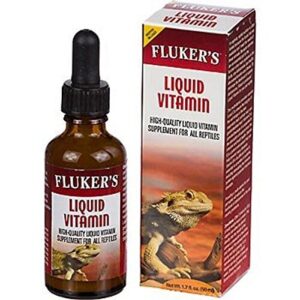
Premium liquid vitamin concentrates deliver targeted nutrition when your reptile needs it most.
These formulations pack essential vitamins A, D3, E, and B-complex into bioavailable solutions that absorb 20-30% faster than powder alternatives.
You’ll appreciate the precise glass dropper for accurate dosing—typically 1-2 drops per 100 grams of body weight.
Mix directly into food or water for seamless administration. However, proceed carefully: some users report severe reactions, including fatalities in sensitive species like chameleons.
Always start with minimal doses and monitor closely.
Best For: Reptile owners seeking precise vitamin supplementation for deficiency correction or preventive care in species that cannot easily consume powder supplements.
- Reported severe adverse reactions including fatalities in sensitive species like chameleons
- Difficult to remove from skin if accidentally touched during handling
- Fragile glass packaging requires careful storage and handling
- Superior bioavailability with 20-30% faster absorption compared to powder forms
- Glass dropper allows precise dosing at 1-2 drops per 100g body weight
- Versatile administration through direct feeding or mixing with food/water
7. Reptile calcium supplement with vitamin
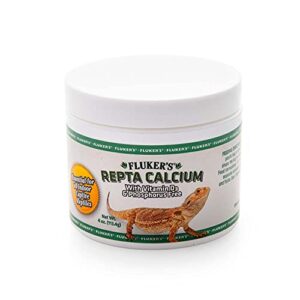
For reptiles kept indoors without natural sunlight, Fluker’s Calcium Reptile Supplement with Vitamin D3 serves as your pet’s lifeline to strong bones.
Strong bones start with the right calcium-to-phosphorus ratio in your reptile’s daily diet
This 4-ounce powder contains bioavailable calcium carbonate enhanced with vitamin D3 for maximum absorption.
Simply dust feeder insects or mix with food to deliver essential nutrients.
The supplement prevents metabolic bone disease in lizards, snakes, turtles, and frogs.
Made in the USA, it provides a phosphorus-free formula that won’t interfere with calcium uptake, making it ideal for captive reptiles.
Best For: Indoor reptile owners who need a reliable calcium supplement to prevent metabolic bone disease in lizards, snakes, turtles, and amphibians without access to natural UVB lighting.
- Contains vitamin D3 for enhanced calcium absorption, essential for reptiles kept without natural sunlight
- Phosphorus-free formula prevents interference with calcium uptake, maximizing nutritional benefits
- Ultra-fine powder easily coats feeder insects and mixes with food for consistent dosing
- Risk of vitamin D3 overdose if used excessively or combined with other D3 sources
- Not suitable as sole nutritional support – requires balanced diet and proper UVB lighting when possible
- 4-ounce container may not be cost-effective for owners with multiple large reptiles
8. Reptile probiotic digestive health supplement
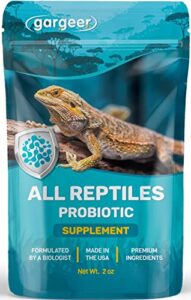
Five live bacterial strains work together to transform your reptile’s digestive health from the inside out.
This premium probiotic powder boosts appetite while clearing parasitic infections and mucousy stools that plague many captive reptiles.
You’ll find the ultrafine particles stick perfectly to feeder insects and blend seamlessly into salads.
Each 2oz jar lasts several months, supporting gut flora balance that enhances nutrient absorption and strengthens immune response against harmful bacteria like Salmonella and E. coli.
Best For: Reptile owners dealing with digestive issues, parasitic infections, or seeking to improve their pet’s gut health and immune system.
- Five live bacterial strains effectively combat harmful pathogens like Salmonella and E. coli while boosting nutrient absorption
- Ultrafine powder formula adheres well to feeder insects and mixes seamlessly into salads for easy administration
- Long-lasting 2oz jar provides several months of digestive support at just 1 teaspoon per pound of food
- Dosage instructions may be unclear for smaller reptiles, requiring careful adjustment to avoid over or under-dosing
- Mixed customer reviews on effectiveness, with some users preferring human probiotics as alternatives
- Packaging issues during shipping can result in broken containers and product loss
Essential Nutrients for Reptile Wellness
Your reptile’s nutritional foundation depends on understanding what they actually need versus what commercial diets provide. Most captive reptiles face nutritional gaps that dietary supplements must bridge to prevent deficiencies and health issues.
Reptile nutrition varies dramatically between herbivorous, carnivorous, and omnivorous species. Mineral balance becomes critical when calcium, phosphorus, and magnesium ratios fall out of alignment. Without proper vitamin needs being met, you’ll notice decreased appetite, poor growth, and weakened immune responses.
Nutrient absorption in reptiles differs substantially from mammals, requiring species-specific approaches to supplementation. Reptile vitamins must account for UV light requirements, temperature-dependent metabolism, and seasonal variations in activity levels.
Effective reptile mineral supplements address deficiencies in commercial foods, while reptile multivitamins fill gaps in vitamin A, D3, and B-complex nutrients. Quality calcium supplements prevent metabolic bone disease by maintaining proper ratios with phosphorus.
Understanding these fundamentals helps you choose targeted supplements rather than guessing at your reptile’s needs.
Calcium and Vitamin D3 for Bone Health
Your reptile’s bones are only as strong as the calcium and vitamin D3 you provide, making this combination the cornerstone of preventing metabolic bone disease.
Without proper calcium-to-phosphorus ratios and adequate D3 for absorption, even the healthiest-looking reptile can develop devastating bone weakness that’s often irreversible.
Calcium-to-phosphorus Ratio
Maintaining the right calcium-to-phosphorus ratio is essential for bone health in your reptile.
The ideal nutrient ratio is 2:1 calcium to phosphorus, though 1.5:1 works too. Most feeder insects offer poor phosphorus balance at 0.3:1, making calcium supplements necessary.
High-quality reptile calcium supplements and vitamin D3 supplements guarantee proper mineral absorption and calcium levels in your pet’s diet.
Understanding reptile calcium needs is critical for preventing metabolic bone disease.
Preventing Metabolic Bone Disease
Up to 90% of metabolic bone disease cases stem from inadequate vitamin D3 or UVB exposure, making prevention your reptile’s lifeline.
Research shows combining oral vitamin D3 supplements with proper UVB lighting reduces MBD risk by 92%.
Daily calcium supplements restore normal bone density within 8-12 weeks when started early.
Don’t wait for tremors or jaw swelling—these warning signs appear in 65% of undetected cases.
Choosing Bioavailable Calcium Sources
Not all calcium supplements work the same way in your reptile’s system. Highly bioavailable calcium forms like calcium carbonate and calcium citrate absorb more efficiently than basic limestone powders.
Look for reptile calcium supplements with third-party bioavailability tests on their labels. These mineral balance formulations help reptile bones utilize calcium properly when paired with vitamin D3.
Choose brands that specify calcium absorption rates for superior results. Reptile owners should research high quality reptile calcium to guarantee the best health outcomes for their pets, using reptile calcium supplements.
Multivitamins and Their Role in Reptile Diets
Multivitamins serve as nutritional insurance for your reptile, filling gaps that commercial diets often leave behind.
You’ll find these extensive supplements particularly valuable during shedding periods and growth phases when your pet’s nutritional demands spike substantially.
Vitamins A, C, E, and B-complex
Essential vitamins work like a nutritional safety net for your reptile’s health.
Vitamin A supports eye health and immune function, while vitamin C boosts wound healing and stress resistance.
Vitamin E acts as a powerful antioxidant protecting cells from damage.
B-complex vitamins fuel energy metabolism and nervous system function.
These reptile vitamin supplements provide thorough immune support and healthy skin care when commercial diets fall short.
Benefits During Shedding and Growth
Your reptile’s shedding and growth phases demand targeted nutritional support.
Multivitamins containing omega-3 fatty acids and biotin improve skin hydration, while B-complex vitamins replenish nutrients lost during shed cycles.
These reptile health supplements boost nutrient absorption and support bone development in growing animals.
Proper reptile nutrition supplements are essential for maintaining peak health and vitality in reptiles.
- Shedding Support – Omega-3s and vitamin E prevent stuck shed incidents by maintaining skin elasticity
- Growth Boosters – Magnesium and zinc facilitate cellular regeneration during rapid development periods
- Skin Health – Double-dose B vitamins accelerate recovery between shed cycles
Beta Carotene Vs. Direct Vitamin A
When choosing reptile vitamins, you’ll find beta carotene offers safer vitamin A conversion than direct supplementation.
Your reptile’s body converts beta carotene to vitamin A as needed, preventing vitamin toxicity risks.
Direct vitamin A supplements can cause overdose symptoms like lethargy and organ damage.
Beta carotene formulations in reptile health supplements provide vitamin safety through natural conversion processes, making them the preferred choice for reptile nutrition.
Reptile owners should research reptile vitamin supplements to verify they’re providing the best nutrition for their pets.
Probiotics and Digestive Support for Reptiles
You’ll want to pay attention to your reptile’s digestive health since stress, diet changes, and environmental factors can disrupt their gut bacteria balance.
Probiotics help maintain healthy digestion and boost nutrient absorption, especially when your pet shows signs of bloating, constipation, or irregular appetite, which can be supported by probiotics.
Maintaining Balanced Gut Flora
Your reptile’s gut microbiome supports digestion and immune function.
Healthy gut flora increases nutrient absorption by 68% and reduces infection rates substantially.
Probiotic supplements containing live Bacillus and Lactobacillus strains maintain flora balance, delivering up to 1 billion CFUs per gram.
Weekly administration improves digestive health in 70% of reptiles while supporting overall wellness.
Addressing Digestive Issues
Spotting trouble early saves your scaly friend from serious health problems.
Watch for bloating, constipation, or reptile diarrhea – these signal disrupted gut flora needing immediate attention.
Stress from handling or environmental changes often triggers digestive enzymes imbalance.
Probiotic supplements restore healthy gut health by rebalancing beneficial bacteria.
Address issues quickly before they worsen into chronic digestive problems requiring veterinary intervention.
Regular use of probiotic supplements can help maintain ideal digestive health in reptiles, which is crucial for preventing chronic digestive problems and ensuring overall gut health.
Probiotic Supplement Options
When digestive issues strike, you’ll want reliable probiotics to restore your reptile’s microbial balance.
Reptile probiotics come in powder and liquid forms, making administration simple. These digestive aid supplements boost gut health by introducing beneficial bacteria that support your pet’s immune system.
Quality reptile health supplements contain specialized bacterial strains that enhance nutrient absorption while promoting overall digestive health in your scaly companion.
For ideal results, consider using products with reptile probiotics to support your pet’s digestive system and overall gut health with beneficial bacteria.
Buying Guide – Key Factors to Consider While Choosing Reptile Vitamins
Choosing the right reptile vitamin requires careful evaluation of ingredients, manufacturing standards, and your pet’s specific needs.
You’ll want to focus on four key areas: ingredient transparency and safety, species-specific formulations, quality certifications, and where to purchase these essential supplements, considering species-specific needs.
Ingredient Transparency and Safety
When shopping for reptile vitamins, only 65% of users find complete ingredient lists on packaging.
Look for products that clearly disclose all components, avoiding those with hidden animal-derived ingredients like gelatin or magnesium stearate.
Choose NASC-certified supplements with third-party testing verification, as Manufacturing Standards guarantee proper safety protocols, while Label Accuracy confirms vitamin levels match claims for effective supplementation.
Reptile owners should prioritize reptile vitamin supplements to guarantee their pets receive essential nutrients and ensure effective supplementation.
Species-specific Formulations
Different species have vastly different nutritional requirements, making one-size-fits-all reptile vitamins potentially harmful.
Here’s what you need to know about species-specific formulations:
- Herbivorous reptiles require higher calcium levels and beta carotene instead of direct vitamin A
- Carnivorous species need different nutrient ratios with more protein-supporting vitamins
- Aquatic turtles benefit from specialized eye health supplements with targeted vitamin A
- Desert lizards require enhanced vitamin D3 formulations for proper calcium absorption
- Snakes need concentrated supplements due to their infrequent feeding patterns
Species needs vary dramatically in nutrient ratios and supplement safety requirements.
Certifications and Manufacturing Quality
Three critical factors separate quality reptile vitamin supplements from questionable options.
Look for GMP Certification and ISO Standards that guarantee strict quality control throughout the manufacturing process. These credentials guarantee regulatory compliance and safe reptile health products.
| Certification Type | What It Guarantees | Why It Matters |
|---|---|---|
| GMP Certification | Strict production controls, purity testing | Prevents contamination in reptile supplement guide recommendations |
| ISO Standards | International quality benchmarks, facility audits | Ensures consistent vitamin and mineral supplementation quality |
| Third-Party Testing | Independent verification, ingredient accuracy |
Validates reptile care supplements meet label claims.
Quality manufacturers openly display these certifications and provide detailed manufacturing process information. This transparency builds trust in reptile health products.
Where to Buy and Cost Evaluation
Purchase reptile health supplements from established pet stores or specialized online retailers for guaranteed authenticity.
Expect quality reptile vitamin supplements to cost $10-$30. Compare brands by checking ingredient lists and customer reviews.
Avoid extremely cheap products that compromise safety. Reputable reptile care supplements providers offer better customer support and return policies than unknown sellers.
When evaluating supplements, consider the role of reptile vitamin supplements in maintaining overall health.
Species-Specific Supplementation and Special Considerations
Different reptile species require customized supplementation approaches that match their unique dietary needs and natural behaviors.
You’ll need to take into account specific nutritional requirements for turtles, iguanas, lizards, and snakes, plus specialized products for appetite stimulation and wound care when health issues arise.
Turtles and Tortoises
Turtles and tortoises need specific nutritional support for ideal shell health and growth.
Their calcium requirements run higher than many reptiles, demanding 2-3% dietary calcium with proper vitamin D3 for absorption.
Key supplementation priorities include:
- Calcium carbonate powder dusted on food twice weekly for growing juveniles
- Beta-carotene multivitamins preventing eye swelling and respiratory issues
- Omega-3 fatty acids supporting shell integrity and healthy skin during shedding.
Over-supplementation causes kidney stones, so you’ll want species-specific formulations.
Iguanas
Iguanas need specialized reptile nutritional supplements to thrive in captivity.
Their herbivorous iguana diet requires high calcium supplements and vitamin D3 for proper bone development.
Beta carotene-based reptile vitamins support their vibrant coloration while preventing vitamin A toxicity.
Quality reptile dietary supplements address common iguana health issues like metabolic bone disease.
Proper iguana care includes regular supplementation to compensate for nutritional gaps in commercial foods and maintain ideal iguana behavior in their habitat with proper bone development.
Lizards
Since lizards span numerous species with varying needs, you’ll need targeted supplementation approaches.
Bearded dragons thrive with calcium-rich formulas, while geckos require specialized vitamin D3 ratios for ideal scale health and lizard behavior.
- Calcium supplements should match your lizard’s species-specific requirements – herbivorous lizards need more than insectivores
- Reptile vitamin D3 supports proper calcium absorption and prevents metabolic bone disease in indoor habitats
- Reptile dietary supplements containing beta carotene safely provide vitamin A without toxicity risks
- Reptile nutritional supplements with probiotics enhance digestion and nutrient absorption for lizard nutrition
- Scale health improves with multivitamins containing vitamins A and E, especially during shedding periods
Snakes
Snakes require targeted reptile health support through species-specific supplementation approaches.
Carnivorous species need different vitamin d3 ratios compared to herbivorous reptiles, with emphasis on immune boosters during shedding cycles.
| Supplement Type | Snake Species | Benefits |
|---|---|---|
| Vitamin D3 | Ball Pythons | Calcium absorption support |
| Immune Boosters | Corn Snakes | Enhanced disease resistance |
| Multivitamins | Boa Constrictors | Complete nutritional coverage |
| Calcium | King Snakes | Bone density maintenance |
| Probiotics | All Species | Digestive health optimization |
The use of probiotics and maintaining the right calcium levels are crucial for the overall health of snakes, and understanding these needs is vital for providing the best care.
Appetite Stimulators and Wound Care
Beyond basic nutrition, appetite boosters and wound healing supplements provide critical reptile health support when your pet faces feeding challenges or injuries.
Synthetic appetite stimulators increase feeding response by 40% in anorexic reptiles, while silver sulfadiazine cream reduces infection rates by 85%.
These reptile wellness products require veterinary guidance for safe dosing and proper injury repair protocols, ensuring the use of appetite boosters is both effective and safe.
Frequently Asked Questions (FAQs)
How often should reptiles receive vitamin supplements?
Like clockwork, you’ll want to dust your reptile’s food with vitamin supplements 2-3 times weekly, adjusting frequency based on species, age, and diet to prevent deficiencies.
Can reptiles overdose on vitamin supplements?
Yes, reptiles can overdose on vitamins, especially fat-soluble ones like A, D3, and E.
Over-supplementation causes toxicity, organ damage, and metabolic issues.
You’ll see lethargy, loss of appetite, and abnormal behaviors when dosing gets excessive.
Do baby reptiles need different supplements?
Baby reptiles are absolutely starving for proper nutrition.
You’ll need calcium-rich supplements more frequently than adults since they’re rapidly growing.
Their developing bones require extra vitamin D3 and calcium to prevent metabolic bone disease during this critical growth phase.
Should supplements be given year-round or seasonally?
You should give supplements year-round since captive reptiles can’t adjust their diets seasonally like wild ones. Consistent supplementation prevents nutritional deficiencies that develop gradually over time.
What signs indicate supplement deficiency in reptiles?
Wondering why your reptile seems sluggish lately?
Watch for reduced activity, movement difficulties, soft or deformed bones, jaw problems, limb issues, poor appetite, dull coloration, frequent shedding problems, and weakened immune responses indicating potential deficiencies.
Conclusion
Ironically, the most overlooked aspect of reptile care often proves the most vital: proper supplementation.
Your pet’s vibrant health depends on quality reptile health supplements that bridge nutritional gaps in commercial diets.
Choose NASC-certified, species-specific formulations combining calcium with vitamin D3, essential vitamins, and probiotics.
These supplements transform struggling reptiles into thriving companions, preventing metabolic bone disease while supporting immune function and digestive health.
Investment ranges from $10-30, but your reptile’s wellbeing is priceless.
- https://www.weknowpets.com.au/blogs/news/essential-guide-to-calcium-supplements-for-pet-reptiles
- https://reptileuv.tripod.com/old-back-ups/probiotics.htm
- https://azeah.com/reptiles-amphibians-reptiles-amphibians-lizards-reptiles-amphibians-tortoises-turtles/diet
- https://www.lllreptile.com/articles/111-vitamins-minerals-and-captive-herps
- https://www.store.repashy.com/vitamin-and-mineral-supplements-breaking-it-down.html

